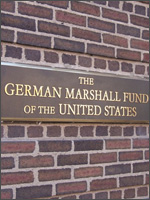| Wednesday, 18 February 2009 | |
|
On February 12, "Art against dictatorship" exhibition of Belarusan dissidents' art was opened at the headquarters of the German Marshall Fund of the United States. There was also a discussion on the current situation in Belarus with Belarusan Diaspora members, Belarusan artists, representatives of diplomatic missions accredited in Washington , U.S. governmental officials and NGOs' representatives.
|
During the discussion the participants exchanged their views on the current situation in Belarus. They were discussing latest changes in the country (the so called "liberalization"), European Union's policy towards Belarus, and what American policy towards Belarus should look like under the new administration. The discussion was moderated by Pavol Demes, director of German Marshall Fund's Belarusan program. Belarusan artists Ales' Shaternik and Ales' Marachkin, The Third Way community coordinator Pavel Marozau, human rights activists Irina Krasouskaya and Tatyana Protko, and the archbishop of Belarusan Autocephalous Church Svyataslau were among the participants. David Swartz, the first U.S. ambassador to Belarus contributed to the discussion as well.
"Art against Dictatorship" exhibition is a joint project of several Belarusan initiatives of the Diaspora realized under the aegis of the New Belarusan Diaspora of Europe and the United States Congress. The exhibition consists of more then 30 works of Belarusan dissident artists and is intended to be a travelling exhibition.
There are works of Belarusan artists Ales Shaternik, Ales Marachkin,Mikola Kupava ,Henadz Draxzdou, Rigor Batalionak, Yury Platonau, Yanka Romanovitch and Julia Shaternik included in the exhibition.
It had been on display in the Estonian Parliament in the Summer of 2008. Future exhibitions in the U.S., Canada, Scandinavia and other countries are being planned. The organizers of the event are The Third Way community, Belarusan Youth Movement of America, and Belarusan Museum in New York. The exhibition has been made possible by support of U.S. Agency for International Development (USAID), German Marshall Fund of the United States, Estonian Valgevene Uus Tee NGO, Open Estonia Foundation and other partner organizations.


















